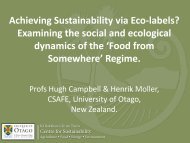Book of Abstract (incl. addendum) - IFSA symposium 2012
Book of Abstract (incl. addendum) - IFSA symposium 2012
Book of Abstract (incl. addendum) - IFSA symposium 2012
Create successful ePaper yourself
Turn your PDF publications into a flip-book with our unique Google optimized e-Paper software.
Workshop 4.1 ‘Civic food networks’ as driver for sustainable food and farming systems<br />
production and sale <strong>of</strong> food. For small producers it’s vital the utilization <strong>of</strong> different kinds <strong>of</strong><br />
certification, because through their utilization they have the possibility to positively differentiate on the<br />
market.<br />
The PDO Carne Mirandesa, has all it’s production sold since 1998. In the year 2010 it sold 268t<br />
from 1960 carcasses. Nationally, it’s the PDO that pays the highest value to producers (5.25€/Kg). In<br />
the production region, the carcasses <strong>of</strong> the same type that aren’t PDO, are paid an average price <strong>of</strong><br />
4€/Kg, being observed a 31% difference.<br />
The paper, analyses the strategy <strong>of</strong> approaching the producers and consumers by allowing the<br />
first a fair valuation <strong>of</strong> the product and the latter have more information and greater security in choice<br />
Exploring the role <strong>of</strong> consumers as drivers <strong>of</strong> agri-food networks: contexts,<br />
beliefs, and governance<br />
Gaetano Martino and Rossella Pampanini<br />
University <strong>of</strong> Perugia, Italy<br />
Gaetano.Martino@unipg.it<br />
The study suggests that governance <strong>of</strong> the short circuits is characterized by constitutional processes<br />
(Grandori, 2010) which are aimed at instituting polycentric systems. The analysis conceptualizes the<br />
food networks as contexts (Dilley, 2002) <strong>of</strong> systems <strong>of</strong> socio-economic relationships and recognizes<br />
that cultural constructs have a prominent role in the dynamics <strong>of</strong> the economic systems via the<br />
institutional dimensions and the collective action framed by policy. The context interaction is thus<br />
thought <strong>of</strong> as a driver <strong>of</strong> governance <strong>of</strong> the system <strong>of</strong> producers-consumers relationhsips. An empirical<br />
analysis is proposed which concerns with the governance <strong>of</strong> purchasing group organizations (GPOs).<br />
Four typical case studies (Seawright, Gerring, 2008) are proposed - GasTezio (Perugia, Central Italy),<br />
Gasp (Arezzo, Central Italy), BioAcquisti (Spoleto, Central Italy), Gas Ricorboli Solidale (Florence,<br />
Central Italy) - in order to corroborate the hypothesis that polycentric governance systems are achieved<br />
by through constitutional processes aimed at achieving a horizontal distribution <strong>of</strong> critical decisions<br />
rights (Gerring, 2004). The research questions are derived from the analytical framework and concern<br />
decision rights distribution among the participants <strong>of</strong> each. The case study constructs were developed<br />
in accordance with these research questions. Criteria for identifying case study typology were<br />
identified in parallel to constructs building (van Duren et al., 2003). Case studies are carried out by<br />
interviews and document analysis. The relationship between case studies and the theoretical hypothesis<br />
proposed is identified within the framework provided by Yin (1994). The analytical generalization<br />
method was applied, in which a previously developed theory is used as a template for comparing the<br />
empirical evidence from case studies (Yin, 1994, p.31) and in which results are generalized into theory.<br />
Co-producing cultural coherency<br />
Xavier Simón Fernández, Damián Copena Rodriguez, Lucia Rodriguez Amoedo, Paul Swagemakers<br />
and Lola Dominguez Garcia<br />
Universidad de Vigo, Spain<br />
Xsimon@uvigo.es<br />
Since the 1960s, modernization en specialisation <strong>of</strong> agricultural food production caused and still causes<br />
a loss in the socio-economic and ecological performance <strong>of</strong> the rural as a productive natural resource<br />
base. From an agro-ecological departure point we study collective forms <strong>of</strong> food governance as<br />
´laboratories’ in which cultural coherency is co-produced between consumers and producers. More in<br />
particular, we analyse how initiatives <strong>of</strong> both producers and consumers contribute on the reorganisation<br />
<strong>of</strong> the relations between nature and society. In this paper we present the preliminary<br />
results <strong>of</strong> a survey held among newly emerging consumer initiatives in Spain. In our analysis we focus<br />
on their socio-ecological and economic 'configuration' and asses the impact <strong>of</strong> these forms <strong>of</strong> civic<br />
71











